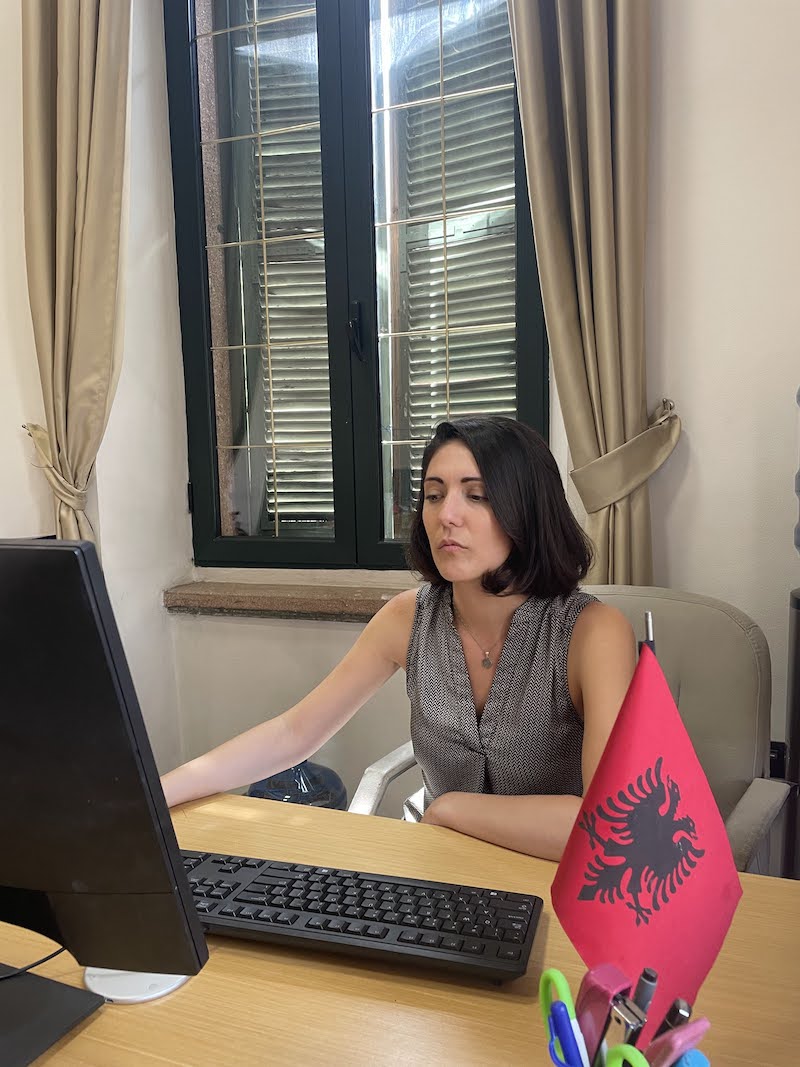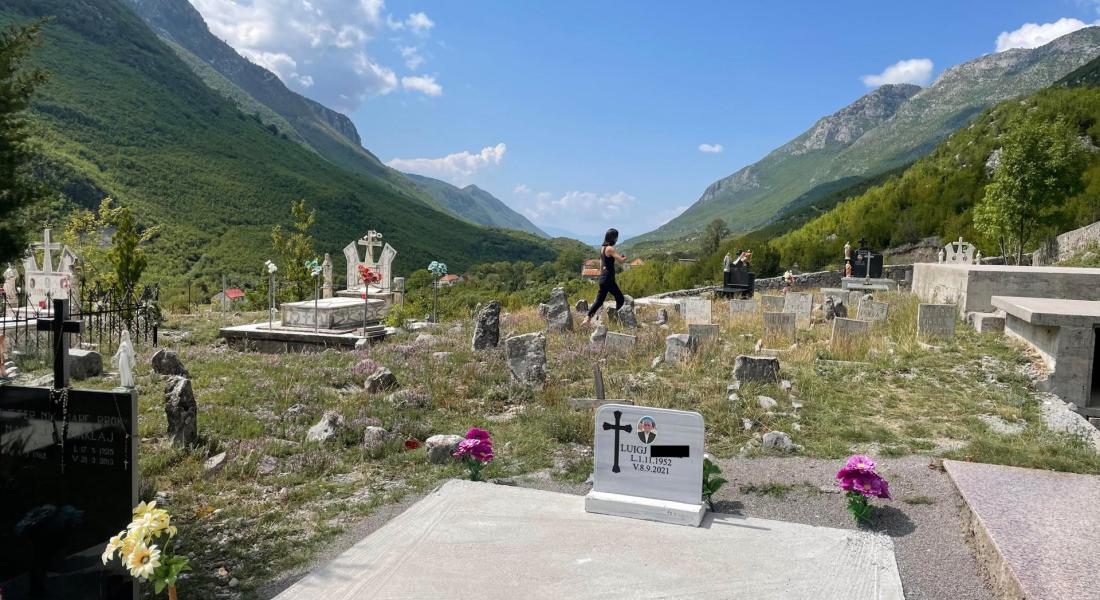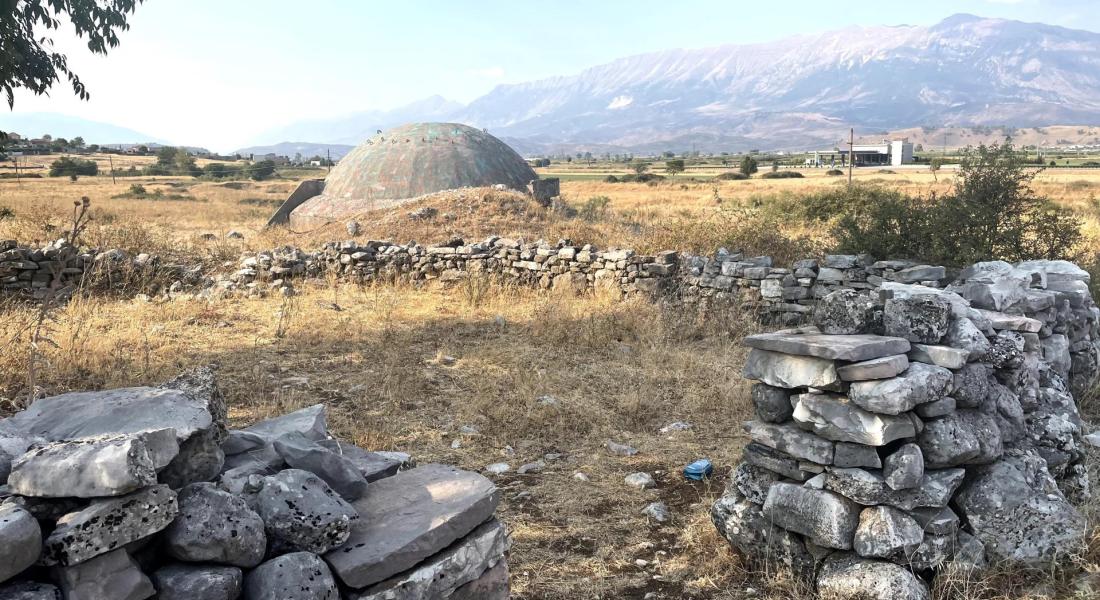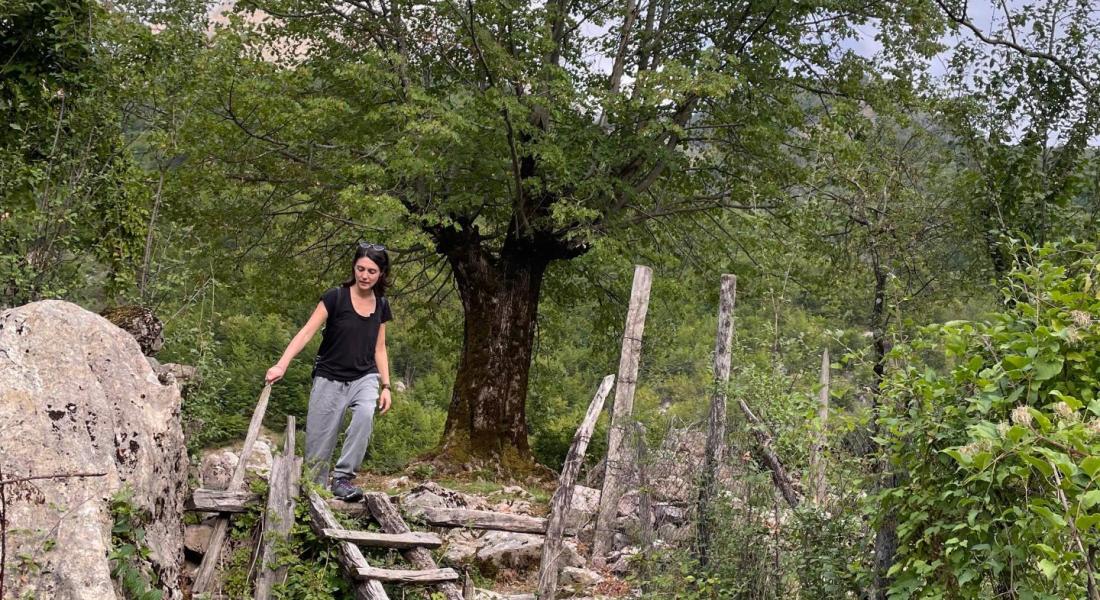From May through June 2022, Kellogg doctoral student affiliate Mary Shiraef (political science) traveled to Albania, on a Kellogg Institute Graduate Research Grant to conduct research for her project, “HOXHA’S BORDER EXPERIMENT ON MINORITY IDENTITY TRANSMISSION: Completing Data Collection on Communist-era Identities in Korçë, Albania.” Upon her return, she sent the following summary of her work.
My dissertation posits that the Greek minority identity in Albania is an ethnic feature of communist-era Albania. With an original dataset sourced by archival records and local cemetery records from the historically disputed region of “Northern Epirus,” I illustrate that under communism, Albania’s approach toward minority groups shaped family structures and religious identities as well as forged measurable long-term variation in political attitudes in the generations who followed. Korçë, Albania is a critical region to my dissertation because its villages compose one of the three groups of my project’s natural experiment – those who were excluded from the Greek minority designation despite having open access to the Greek identity prior to communism. The other two groups of my study are 1) those who were designated as the Greek minority and 2) those who were born in northern Greece, experiencing Greece’s national identity program which did not recognize minorities. The research question is: what were the long-term effects of Albania’s dictator’s approach to engineering the Greek minority identity?
 I was able to collect archival data comprehensively from Korçë’s records for 90 villages at Albania’s Ministry of Interior as well as from the cemeteries of those same villages. I also was able to transcribe half of these villages simultaneously with my data collection, saving my project over a month of work. The work was at times, fascinating, and other times, monotonous – but the knowledge that I am the first researcher to collect and transcribe these records of great historical and scientific importance motivated me eagerly through each day of the work.
I was able to collect archival data comprehensively from Korçë’s records for 90 villages at Albania’s Ministry of Interior as well as from the cemeteries of those same villages. I also was able to transcribe half of these villages simultaneously with my data collection, saving my project over a month of work. The work was at times, fascinating, and other times, monotonous – but the knowledge that I am the first researcher to collect and transcribe these records of great historical and scientific importance motivated me eagerly through each day of the work.
It was an interesting time to be based in Albania. Two significant events occurred while I was there bringing Albania into international news as referenced in my report submitted after presenting at the European Political Science Association conference. First, Ukraine gained European Union (EU) status in four months, a process which took Albania five years (between 2009-14). Albania’s transition from candidate to member state is contingent on the simultaneous application of the bordering state of North Macedonia, which achieved candidate status in 2005. But North Macedonia’s claim is effectively blocked by its bordering EU member state of Bulgaria due to Macedonia’s claim of a Macedonian minority in Bulgaria, which Bulgaria asserts is an unacceptable historical revision of their common ethnic and linguistic roots. This was a contentious topic in Albania and highly related to my work’s which captures ethnic and linguistic data.
Second, to my surprise, ex-Vice President of the United States (U.S.), Mike Pence visited Albania’s capital city of Tirana and addressed the 3,000 Iranian dissidents housed near there, calling for continuation of the Trump-era cancellation of a U.S. nuclear deal with Iran. The event was not widely covered by left-leaning U.S. news outlets, but it was a significant event in Albania, and was covered by the Washington Post as well as Fox News. The group Pence addressed composes part of the Mujahedeen-e-Khalq (MEK), a Marxist group which initially supported Iran’s 1979 Islamic Revolution, but soon fell out with its clerical leader, and later fled to Iraq, backing Saddam Hussein’s regime, which diminished popular support for the group in Iran. Now the group is predominantly based in Albania but claims to operate a network inside Iran. Albania’s recent history is especially tied to the U.S. Republican party, with former U.S. President George W. Bush visiting in 2007, after which a major street in Tirana was named after him.
Three additional significant events occurred since I submitted that report. First, two Russian agents and one Ukrainian were caught attempting to enter a military plane in Albania. The Albanian guards who confronted them were seriously injured from the intruders’ use of a spray with unknown chemicals. Second, a child was accidentally killed in Himare by a police officer on a speedboat, sparking large protests at the Ministry of Interior, where I was working each day. And third, a major cyber attack occurred of Ministry of Interior, which erased all prior official emails – including my proposal to work there in the first place. This breech was not reported in local or international media to my knowledge.
I have learned a great deal from the records I was able to access. Because the process is ongoing however, I cannot yet detail general statistics. In about a month’s time, I will provide an overview of the data and submit my job market paper for publication.
In terms of setbacks, my data extraction from the Ministry did not start on time because department heads at the Ministry of Interior consider my topic to be related to national security. The day I arrived they requested additional approvals to be sent from Notre Dame despite having approved the project previously. My department’s Director of Graduate Studies and administrative assistant assisted with this within a week’s time. Undoubtedly resulting from the major events interacting with their institution, many of the people I was working with were on edge, slow to respond to some basic requests, and cautious about my work – the topic of which was deemed a national security issue in the 1990s. The institutional structure remains illegible to me. A cultural component in Albania I learned from the experience is that people tend to be reticent to tell you no. “Everything is possible in Albania, maybe – eventually,” was how one of trusted field contacts explained it to me. “No one tells you no to anything.” This deterred communication style initially was a source of frustration for my project since some questions about my access needed yes/no answers – as well as a timeline. But once I understood this cultural component of working in the Ministry, I learned to work around it. The good news is that my access to their server was maintained throughout my work. With Kellogg’s support, I gathered a substantial amount of data for my project no one has examined before.
Regarding the days of work missed upon arrival, I was able to make up for some of this lost time and data coverage with good news I received from my paused Boren Fellowship. After two years of delay, the Department of Defense’s pandemic-era rule against use of their funds for research in Albania was lifted. This allowed my project an additional $3,000 for human costs associated with processing the data. In the same period, I learned I had won a $2,500 Summer Centennial award from the American Political Science Association (APSA), an award typically given to faculty research and associated with an awards ceremony at APSA. Together, these funds allowed me to stay longer in Tirana and complete my research this summer at nearly the amount I initially proposed. I am confident that the Kellogg award contributed to the success of the additional APSA award.








